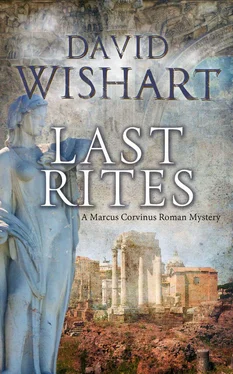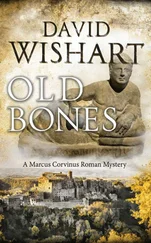David Wishart - Last Rites
Здесь есть возможность читать онлайн «David Wishart - Last Rites» весь текст электронной книги совершенно бесплатно (целиком полную версию без сокращений). В некоторых случаях можно слушать аудио, скачать через торрент в формате fb2 и присутствует краткое содержание. Год выпуска: 2016, Жанр: Исторический детектив, на английском языке. Описание произведения, (предисловие) а так же отзывы посетителей доступны на портале библиотеки ЛибКат.
- Название:Last Rites
- Автор:
- Жанр:
- Год:2016
- ISBN:нет данных
- Рейтинг книги:3 / 5. Голосов: 1
-
Избранное:Добавить в избранное
- Отзывы:
-
Ваша оценка:
- 60
- 1
- 2
- 3
- 4
- 5
Last Rites: краткое содержание, описание и аннотация
Предлагаем к чтению аннотацию, описание, краткое содержание или предисловие (зависит от того, что написал сам автор книги «Last Rites»). Если вы не нашли необходимую информацию о книге — напишите в комментариях, мы постараемся отыскать её.
Last Rites — читать онлайн бесплатно полную книгу (весь текст) целиком
Ниже представлен текст книги, разбитый по страницам. Система сохранения места последней прочитанной страницы, позволяет с удобством читать онлайн бесплатно книгу «Last Rites», без необходимости каждый раз заново искать на чём Вы остановились. Поставьте закладку, и сможете в любой момент перейти на страницу, на которой закончили чтение.
Интервал:
Закладка:
I looked down. Between the door and the bed, splashed like spilled wine across the white marble flooring, was a red stain. I edged carefully round it and Arruntius followed me.
Torquata had pulled back the sheet and was gazing down at the body beneath it.
‘The silly girl,’ she said softly. ‘The silly, silly girl!’
They’d left her flame-coloured veil covering her face, but these things are light as gossamer and almost as transparent. Girl she wasn’t, although she didn’t miss by much: I’d reckon early twenties, twenty-five max. And she’d been beautiful; even the axe-blade nose jutting straight up at the ceiling added to the beauty, giving it character. Her face was all strong lines, the features clear-cut with no blurring flab. I’d guess that when she’d been alive this lady had had a mind of her own.
How she’d died was obvious at the first glance. The throat just beneath her chin was nothing but a gaping hole.
‘I took the knife out myself,’ Torquata said. She looked and sounded old, now, and not hard at all. ‘Her hands were still round the hilt.’
My stomach went cold. Dear sweet Jupiter! So that was what all the reticence had been in aid of. ‘She killed herself?’
‘That’s the question we need you to answer, Corvinus,’ Arruntius said. ‘You see how it looks, but the truth may be otherwise. We have to know, either way.’
‘She was lying beside the door. Where the blood is.’ Torquata laid her hand, very gently, on the woman’s head, above where the six tresses lay beneath the veil. ‘There was no sign of any struggle. I put her on the bed when I’d removed the knife.’
‘You’ll want to see that too, of course.’ Arruntius crossed to the clothes chest and brought back a small bloodstained bundle. I unwrapped it – they’d used a napkin from the dining-room – to reveal a cheap double-edged knife with a broad blade fitted into a wooden handle and bound in place with a strip of undyed leather: the sort of thing you could pick up anywhere in Rome with change out of a silver piece. I wiped it on the napkin and tested the edge with my thumb. It’d been ground and then carefully whetted until it was razor-sharp; you could’ve shaved with it, easy.
‘This belong to Cornelia?’ I asked Torquata.
‘I don’t know, young man. I certainly hadn’t seen it in her possession before, but that means nothing.’
‘Uh-huh.’ I wrapped the knife up again and gave it to Arruntius. Then I turned back to the corpse. Beyond the veil’s edge I could see the line of a leather thong that disappeared under the neck of the woman’s mantle. Carefully, very carefully, I lifted the veil a little and pulled at the thong. Beside me I felt Torquata stiffen, but she made no move to stop me.
At the thong’s end, threaded like the pendant of a necklace, was a man’s signet ring. Arruntius grunted but he said nothing; nor did Torquata. The silence was almost deafening. Oh, hell, no: cat’s-meat factory was right. I held the ring up as far as I could without disturbing the veil so they could see it clearly. The stone was a garnet, and it showed two clasped hands.
‘You recognise this, Junia Torquata?’ I said.
She was quiet for a long time. Then she shook her head.
‘No,’ she said firmly. ‘I do not.’
Deliberately, I shrugged and kept my eyes away from hers and my hand steady as I laid the ring down on the dead woman’s chest. Torquata knew, we all did, what the implications were of a Vestal carrying a man’s ring in her bodice. Or at least the possible implications. I didn’t have to spell them out, nor did I want to: some things are best left unsaid, in case saying them makes them true.
‘You’ve seen enough?’ Arruntius said. His voice was strained and very formal.
‘Yeah.’ I turned away while Torquata pulled the sheet back up. ‘Yeah. I’ve seen enough.’
I was feeling cold and sick and empty. Oh, Jupiter! Dear holy Jupiter!
I knew now why Torquata had called it simply ‘a death’. Murder was bad, sure, and a Vestal’s murder was worse; but the responsibility – and the penalty – for it would lie squarely on the killer. Suicide in itself is no crime, not even for a Vestal. The crime lay in the cause, and in the case of a young woman who carried a man’s ring next to her heart there could only be one crime that leaped immediately to mind. Vestals, like I say, are the most sacred things in Rome. They’re sacred because the whole spiritual and physical health of the state depends – literally – on their chastity. A Vestal who breaks her vows is a danger and an abomination, and there’s only one penalty, mandatory even in these enlightened days. An unchaste Vestal is buried alive.
Torquata had to know, however much it hurt; Rome had to know. And the chief Vestal was hoping against all the evidence, against the evidence of her own eyes, that Cornelia’s death had been murder.
Murder, at least, was clean.
3.
We left the room and Torquata closed the door gently behind us.
‘Okay,’ I said. Gods, I hated this. ‘You want to fill me in on the background before we rejoin the others?’
Torquata drew herself up like a battle-weary centurion getting ready to give an unpleasant report.
‘It happened after the rites were over,’ she said. ‘The ceremonial meal also, if only just. Some time during the sixth hour.’
‘Uh-huh.’ Halfway to dawn, in other words. ‘How many people are we talking about?’
‘Present in the house? Six Vestals. Thirty invited celebrants, plus the servants and the musicians. In all, sixty. All women, of course.’
‘Right.’ While she was speaking I was having a look round the far side of the staircase at the screened section of wall. Immediately behind it was a solid, no-nonsense door that looked like it’d been there since the house was built a dozen generations back. There was no keyhole but it was fitted top, bottom and middle with heavy iron bolts that would’ve kept out anything short of a battering ram. The bolts were firmly shot home. ‘This is the back door?’
‘Yes. It opens on to an alleyway.’ That was Arruntius. ‘It’s the only other way into the house apart from the front door itself. That was bolted too, naturally, while the ceremony was in progress.’
There was a lamp set into an embrasure just to the left, and its light glistened on the marble at my feet. I bent down and brushed the tip of my finger against the floor. It came away damp; not wet, just damp. It could’ve been condensation or seepage, sure, but on the other hand …
‘What’s upstairs?’ I said.
‘Mostly family rooms, with storage space above that. The slaves sleep in the attics.’
‘And the corridor we came along?’
‘A private bath suite with a latrine attached. On the atrium side there’s the kitchen and a couple of storerooms.’
‘Uh-huh.’ I pointed to the second passageway, opposite the one we’d come through. ‘Where does that lead?’
‘To the garden. There’s a door at the far end but it’s unlocked. The garden’s an enclosed one.’
‘You mind if I take a look?’
‘Go ahead, Corvinus.’ Arruntius’s lips twisted. ‘You’re in charge.’ And I don’t envy you, his tone said. Right. I didn’t envy myself: we were going through the motions here, and all of us knew it.
I went down the passage. Sure enough, there was an open door at the end. Beyond was a big walled garden, formally laid out with statues, walks and rose beds. It would’ve been beautiful in summer, I’d’ve guessed, but in December it just looked bleak. The walls, what I could see of them, were ten foot high, easy.
Arruntius was standing behind me. ‘The only other way in is from the atrium, through that covered porch there to your left.’
Читать дальшеИнтервал:
Закладка:
Похожие книги на «Last Rites»
Представляем Вашему вниманию похожие книги на «Last Rites» списком для выбора. Мы отобрали схожую по названию и смыслу литературу в надежде предоставить читателям больше вариантов отыскать новые, интересные, ещё непрочитанные произведения.
Обсуждение, отзывы о книге «Last Rites» и просто собственные мнения читателей. Оставьте ваши комментарии, напишите, что Вы думаете о произведении, его смысле или главных героях. Укажите что конкретно понравилось, а что нет, и почему Вы так считаете.











